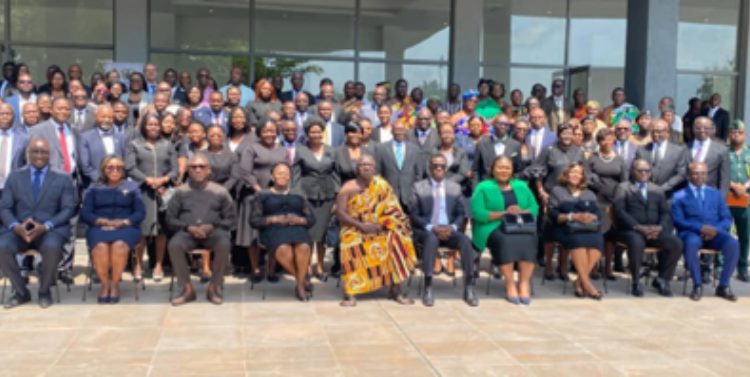A group picture of participants
Efforts are underway to ensure the digitisation of Ghana’s judicial system as part of measures to increase efficiency in justice delivery.
The Chief Justice, Justice Gertrude Araba Esaaba Sackey Torkornoo, who disclosed this indicated that the project of digitisation is actively going on through the directorate of documentation.
She said this will help lighten the congestion in docket rooms, and make them less of a fire and health hazard.
The Chief Justice was speaking at the 2024 Annual Chief Justice’s Forum held in Takoradi yesterday.
It was on the theme, ‘Building the Pillars of Justice through Leadership Innovation and Technology’.
The annual event allows the Judiciary and Judicial Service to account to communities regarding how justice is being administered for them, and for the communities to be able to give feedback to the judicial service and judiciary.
She stressed that the courts are easily described as the registry of the rights of citizens adding, “When a matter goes through the courts, the parties must be able to access their records after that”.
“We must have the records of all the cases that have been tried and worked on in the courts for more than a century,” she added.
She said there is therefore an urgent need to work on appropriate archiving of old records, preserving them in digitised forms, and storing them for easy searches and access.
The Chief Justice said since 2019, the judiciary, has piloted an integrated E-Justice platform in the 52 courts in the Law Court Complex in Accra.
“The aim is to break the trauma of constant adjournments, waste of money and time through interminable journeys to courts, and to provide less confrontational means to resolving disputes with finality,” he explained.
She, however, pointed out that mainstreaming technology for all courts has been slow and a laborious work, mainly because of the vast infrastructure needed to make an integrated virtual system work well.
“One needs stable power, stable internet connectivity, dedicated servers and a robust stock of devises that must be constantly maintained and changed, including staff that are trained to use them”, she added.
“Currently, with the help of all stake holders, teams of judges, and staff, we continue to work hard to make electronic filing, electronic dockets, and virtual hearings available in different courts,” she revealed.
She was grateful to the World Bank through the government for assisting the sustainability of funding that will increase the use of technology for justice delivery.
President of the Ghana Bar Association, Efua Ghartey, called on her colleague lawyers to do all within their power help enhance access to justice by the citizenry.
The Western Regional Minister, Kwabena Okyere Darko-Mensah, charged the judiciary to remain resolute and firm in their work for justice to be delivered and to protect the fundamental human rights and freedoms enshrined in the constitution.
From Emmanuel Opoku, Takoradi


